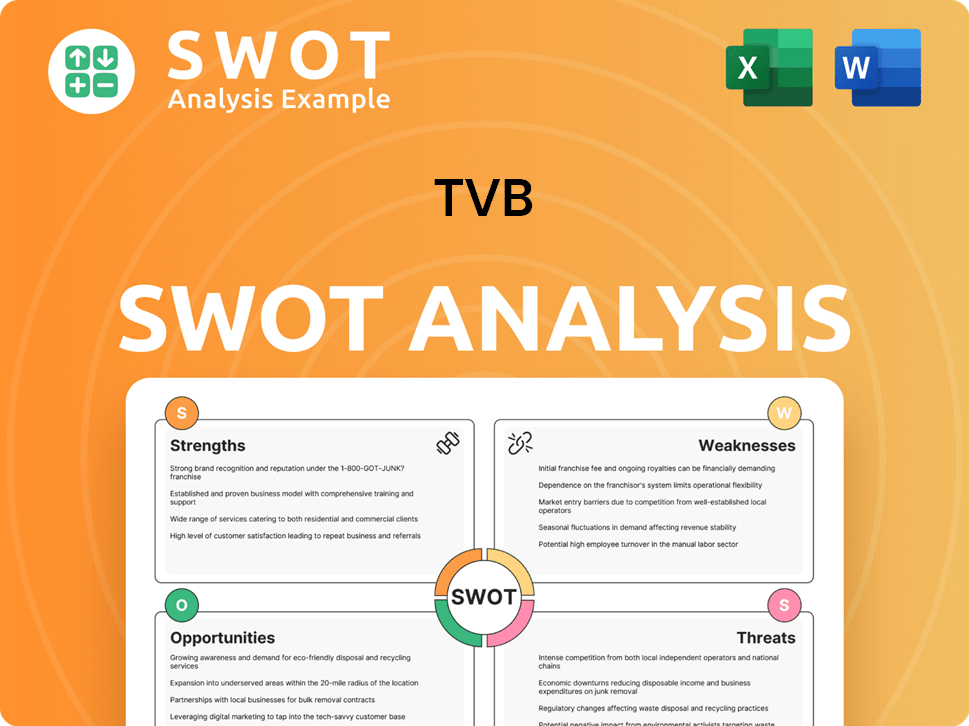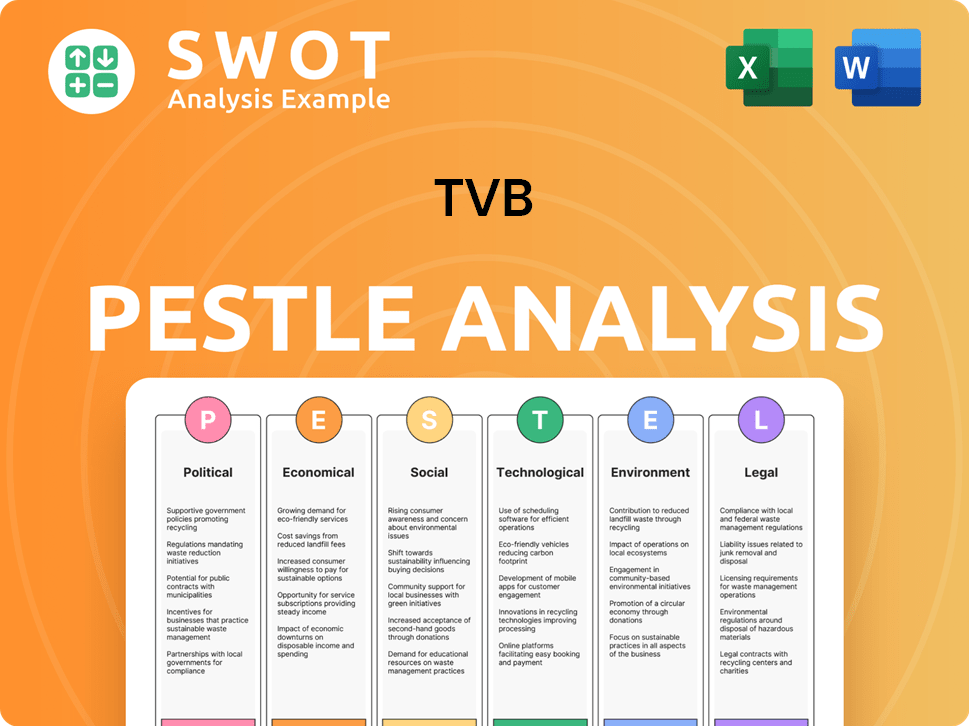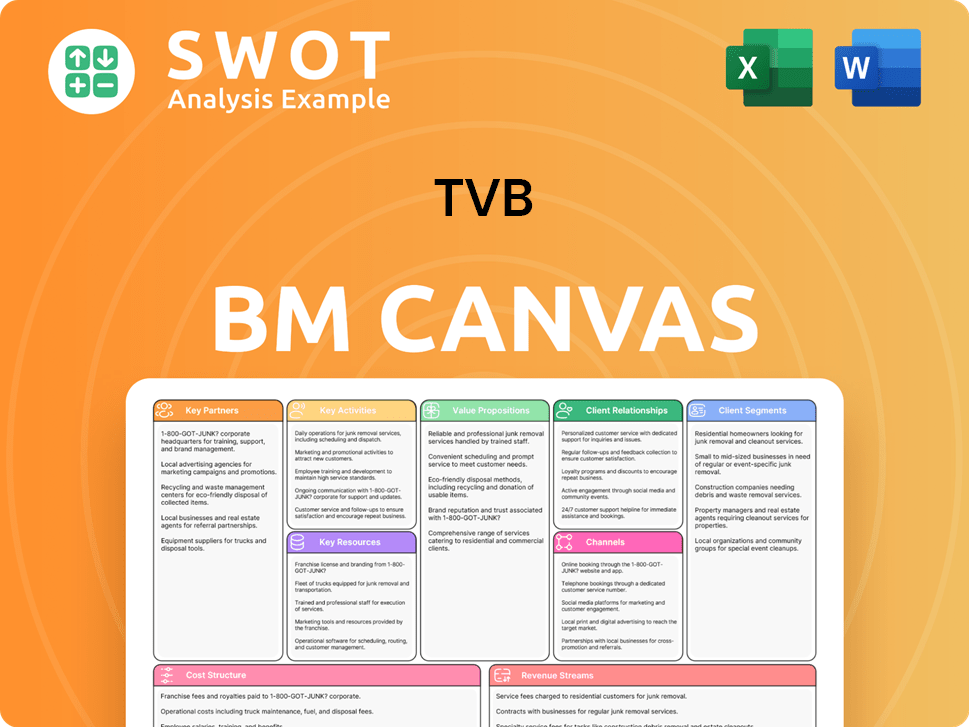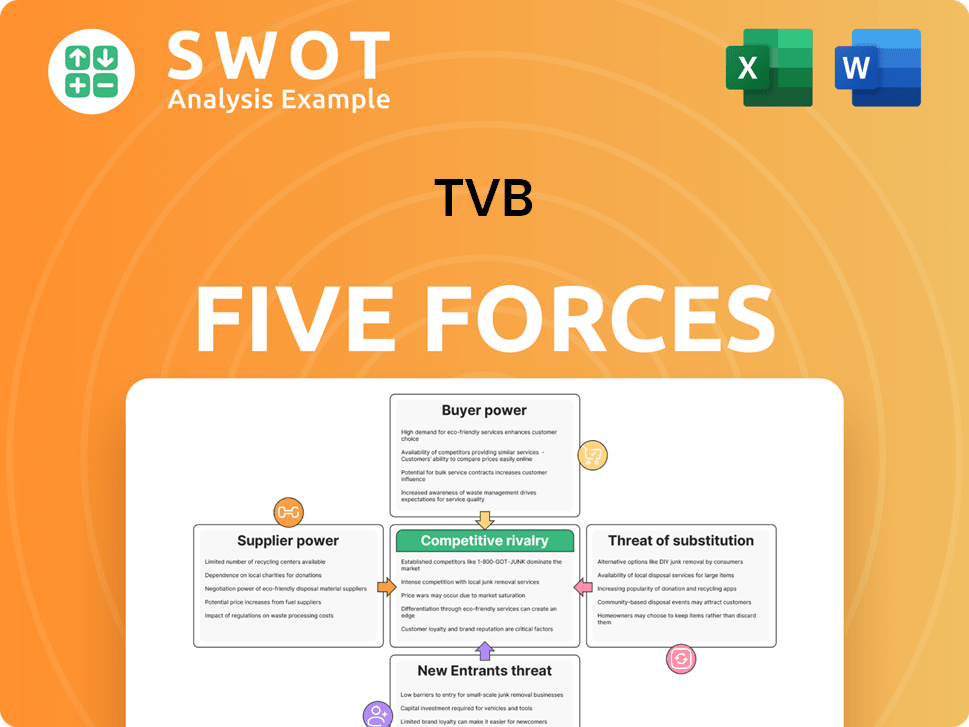TVB Bundle
Decoding TVB: How Does This Media Giant Operate?
For decades, TVB, a prominent TVB SWOT Analysis, has been a cornerstone of entertainment and information for the people of Hong Kong. As the first commercial television station in the region, TVB has shaped cultural norms, delivering news, dramas, and variety shows to millions. Its pervasive presence in households signifies its significant role in the lives of Hong Kong citizens and the wider Cantonese-speaking community.

This deep dive into the TVB company will help you understand its core operations and value creation. We'll explore its diverse revenue streams, strategic adaptations, and how it navigates the competitive landscape of Hong Kong television. Whether you're curious about TVB drama production process, its TVB news coverage, or the Chinese entertainment industry, this analysis offers valuable insights into a media giant.
What Are the Key Operations Driving TVB’s Success?
The core operations of the TVB company center on creating, broadcasting, and distributing television content. Primarily, it caters to the Cantonese-speaking audience in Hong Kong and globally. Its main offerings include free-to-air television channels like Jade, Pearl, J2, and the TVB Finance, Sports & Information Channel, which broadcast a variety of programming such as news, dramas, variety shows, and infotainment.
Additionally, TVB distributes content through digital platforms, including MyTV SUPER, which provides live streaming, video-on-demand, and catch-up services. This approach aligns with the evolving consumer demand for on-demand content. The value proposition of TVB lies in its well-established brand recognition, its extensive content library, and its ability to produce high-quality, localized programming that resonates with its target audience. This includes the TVB Hong Kong market.
The operational processes are vertically integrated, covering content conceptualization, scriptwriting, production, broadcasting, and distribution. TVB has a strong competitive advantage in delivering culturally relevant and engaging content to its dedicated viewership.
Content creation involves conceptualizing, writing scripts, and producing television programs. This includes drama series, variety shows, and news programs. TVB employs a large team of writers, producers, directors, and actors to create its content. The production process includes studio filming, location shoots, and post-production editing.
Broadcasting is the process of transmitting the content to viewers through free-to-air channels and digital platforms. Distribution involves making the content available to viewers through various channels. TVB distributes its content through its own channels, as well as through partnerships with other media companies. The company has expanded its reach through its streaming service, MyTV SUPER.
Talent management is a crucial aspect of TVB's operations, involving the recruitment, training, and management of actors, actresses, and other on-screen talent. The company has a long history of nurturing talent, with many famous actors and actresses starting their careers at TVB. This includes the TVB actors and actresses.
TVB has invested in digital platforms to cater to the changing viewing habits of audiences. MyTV SUPER is TVB's primary streaming service, offering a wide range of content on demand. This includes live streaming of channels, video-on-demand, and catch-up services. The digital platforms have become increasingly important for TVB's distribution strategy.
The operational processes are vertically integrated, encompassing content conceptualization, scriptwriting, production, broadcasting, and distribution. TVB's extensive production capabilities allow it to control the quality and volume of its content. Its supply chain involves sourcing talent, equipment, and production materials, while its distribution networks leverage both traditional broadcast infrastructure and modern digital platforms.
- Content Production: TVB produces a wide variety of content, including drama series, variety shows, news, and infotainment.
- Broadcasting: TVB broadcasts its content through free-to-air channels and digital platforms.
- Distribution: TVB distributes its content through its own channels, as well as through partnerships with other media companies.
- Digital Platforms: MyTV SUPER is TVB's primary streaming service, offering a wide range of content on demand.
TVB SWOT Analysis
- Complete SWOT Breakdown
- Fully Customizable
- Editable in Excel & Word
- Professional Formatting
- Investor-Ready Format

How Does TVB Make Money?
The TVB company generates revenue through a mix of advertising, subscription services, and content licensing. This diversified approach helps the Hong Kong television giant maintain financial stability in a competitive media landscape. Understanding these revenue streams is key to grasping how TVB operates and sustains its presence in the Chinese entertainment industry.
Advertising, a traditional revenue source, remains significant, with brands advertising on free-to-air channels and digital platforms. Subscription services, particularly through MyTV SUPER, are growing in importance, offering exclusive content and ad-free viewing. Content licensing to overseas broadcasters and digital platforms also provides a steady income stream.
The media company also explores other monetization strategies, such as e-commerce and event organization. This ongoing adaptation to the changing market dynamics helps TVB stay relevant and financially viable. For a deeper dive into how TVB approaches marketing, consider reading about the Marketing Strategy of TVB.
The primary ways TVB generates income include:
- Advertising: Revenue from commercials on free-to-air channels and digital platforms. Exact figures fluctuate, but advertising has historically contributed a substantial portion of revenue.
- Subscription Services: Income from MyTV SUPER subscriptions, offering premium content and ad-free viewing. This is an increasingly important revenue stream.
- Content Licensing and Distribution: Revenue from licensing programs to overseas broadcasters and digital platforms, particularly within the Chinese diaspora. This includes licensing its extensive library of dramas and other programs.
- Other Monetization Strategies: Includes e-commerce initiatives and event organization to further expand its revenue base.
TVB PESTLE Analysis
- Covers All 6 PESTLE Categories
- No Research Needed – Save Hours of Work
- Built by Experts, Trusted by Consultants
- Instant Download, Ready to Use
- 100% Editable, Fully Customizable

Which Strategic Decisions Have Shaped TVB’s Business Model?
The journey of the TVB company has been defined by pivotal moments that have shaped its operational and financial path. Established in 1967, it became Hong Kong's first wireless commercial television station, marking a groundbreaking beginning. Over the decades, the consistent production of popular drama series has built a strong brand and loyal viewership. A key strategic move in recent years has been the aggressive push into digital platforms, such as MyTV SUPER, to adapt to the changing media landscape.
The TVB company has faced challenges, including growing competition from local and international streaming services, shifting consumer preferences, and economic downturns affecting advertising revenue. In response, it has focused on content diversification, investing in various genres and formats to attract a wider audience. Its competitive advantages include strong brand recognition in Hong Kong, a vast library of original content, and a deep understanding of the local market.
TVB continues to evolve by exploring new technologies and forging strategic partnerships to expand its reach and maintain relevance. The company's ability to adapt and innovate is crucial in a rapidly changing media environment. For further insights into the company's ownership structure, you can explore Owners & Shareholders of TVB.
The establishment of TVB in 1967 as Hong Kong's first commercial television station was a significant milestone. The company's success was further solidified by the consistent production of popular drama series. The launch of MyTV SUPER marked a strategic shift towards digital platforms.
TVB has aggressively expanded into digital platforms to counter declining traditional TV viewership. The company has focused on content diversification, investing in a variety of genres. Strategic partnerships are being forged to expand reach and maintain relevance.
The company benefits from unparalleled brand recognition in Hong Kong. TVB has a vast library of original content. It possesses a deep understanding of the local market and cultural nuances.
TVB faces competition from local and international streaming services. Economic downturns have impacted advertising revenue. The company is exploring new technologies and interactive content.
In recent financial reports, the TVB company has shown resilience despite market challenges. The company's focus on digital platforms and content diversification has helped maintain its market position in Hong Kong. Recent data indicates that the company is actively seeking to enhance its revenue streams through various strategic initiatives.
- TVB's revenue streams include advertising, subscription services, and content licensing.
- The company has been investing in new technologies to enhance content delivery.
- Strategic partnerships are being formed to expand its reach in the international market.
- The company's brand recognition remains a key competitive advantage.
TVB Business Model Canvas
- Complete 9-Block Business Model Canvas
- Effortlessly Communicate Your Business Strategy
- Investor-Ready BMC Format
- 100% Editable and Customizable
- Clear and Structured Layout

How Is TVB Positioning Itself for Continued Success?
The TVB company, a major player in the Hong Kong television market, has historically held a dominant position. However, its industry position faces increasing challenges from digital platforms and streaming services. Despite these shifts, it maintains strong brand loyalty, particularly for its news and drama content, and extends its reach through content distribution to overseas Chinese communities.
Looking at the future, TVB Hong Kong aims to evolve into a comprehensive media and entertainment platform. This involves integrating traditional broadcasting with digital innovation to attract new audiences and revenue streams. This strategic shift is essential for long-term sustainability in a rapidly changing media landscape.
Historically dominant in Hong Kong's free-to-air television market. Strong brand loyalty among core audiences for news and local drama. Global reach through content distribution to overseas Chinese communities.
Increasing fragmentation of media consumption, with viewers shifting to digital platforms. Regulatory changes and economic downturns impacting advertising revenue. Intense competition from international streaming giants.
Strengthening its digital ecosystem and expanding its MyTV SUPER subscriber base. Diversifying content offerings to appeal to younger demographics. Exploring new revenue streams like e-commerce and live commerce.
Transforming into a comprehensive media and entertainment platform. Integrating traditional broadcasting with digital innovation. Aiming to capture new audiences and revenue opportunities.
In 2024, the Hong Kong media market is highly competitive, with significant pressure on traditional broadcasters like TVB. The company's revenue streams are being affected by the shift towards digital platforms, impacting advertising revenue and viewership. The need for strategic adaptation is crucial for maintaining market share and profitability.
- Market Share Dynamics: The market share of traditional television in Hong Kong continues to decline as streaming services gain popularity.
- Revenue Trends: Advertising revenue, a significant income source for TVB, faces challenges due to economic fluctuations and competition from digital advertising.
- Subscription Growth: The growth of the MyTV SUPER subscriber base is critical, as it represents a key element in TVB's digital strategy and revenue diversification.
- Content Strategy: Investment in high-quality content that appeals to both local and international audiences is essential for attracting viewers and generating revenue through content distribution and licensing. Learn more about Growth Strategy of TVB.
TVB Porter's Five Forces Analysis
- Covers All 5 Competitive Forces in Detail
- Structured for Consultants, Students, and Founders
- 100% Editable in Microsoft Word & Excel
- Instant Digital Download – Use Immediately
- Compatible with Mac & PC – Fully Unlocked

Related Blogs
- What are Mission Vision & Core Values of TVB Company?
- What is Competitive Landscape of TVB Company?
- What is Growth Strategy and Future Prospects of TVB Company?
- What is Sales and Marketing Strategy of TVB Company?
- What is Brief History of TVB Company?
- Who Owns TVB Company?
- What is Customer Demographics and Target Market of TVB Company?
Disclaimer
All information, articles, and product details provided on this website are for general informational and educational purposes only. We do not claim any ownership over, nor do we intend to infringe upon, any trademarks, copyrights, logos, brand names, or other intellectual property mentioned or depicted on this site. Such intellectual property remains the property of its respective owners, and any references here are made solely for identification or informational purposes, without implying any affiliation, endorsement, or partnership.
We make no representations or warranties, express or implied, regarding the accuracy, completeness, or suitability of any content or products presented. Nothing on this website should be construed as legal, tax, investment, financial, medical, or other professional advice. In addition, no part of this site—including articles or product references—constitutes a solicitation, recommendation, endorsement, advertisement, or offer to buy or sell any securities, franchises, or other financial instruments, particularly in jurisdictions where such activity would be unlawful.
All content is of a general nature and may not address the specific circumstances of any individual or entity. It is not a substitute for professional advice or services. Any actions you take based on the information provided here are strictly at your own risk. You accept full responsibility for any decisions or outcomes arising from your use of this website and agree to release us from any liability in connection with your use of, or reliance upon, the content or products found herein.